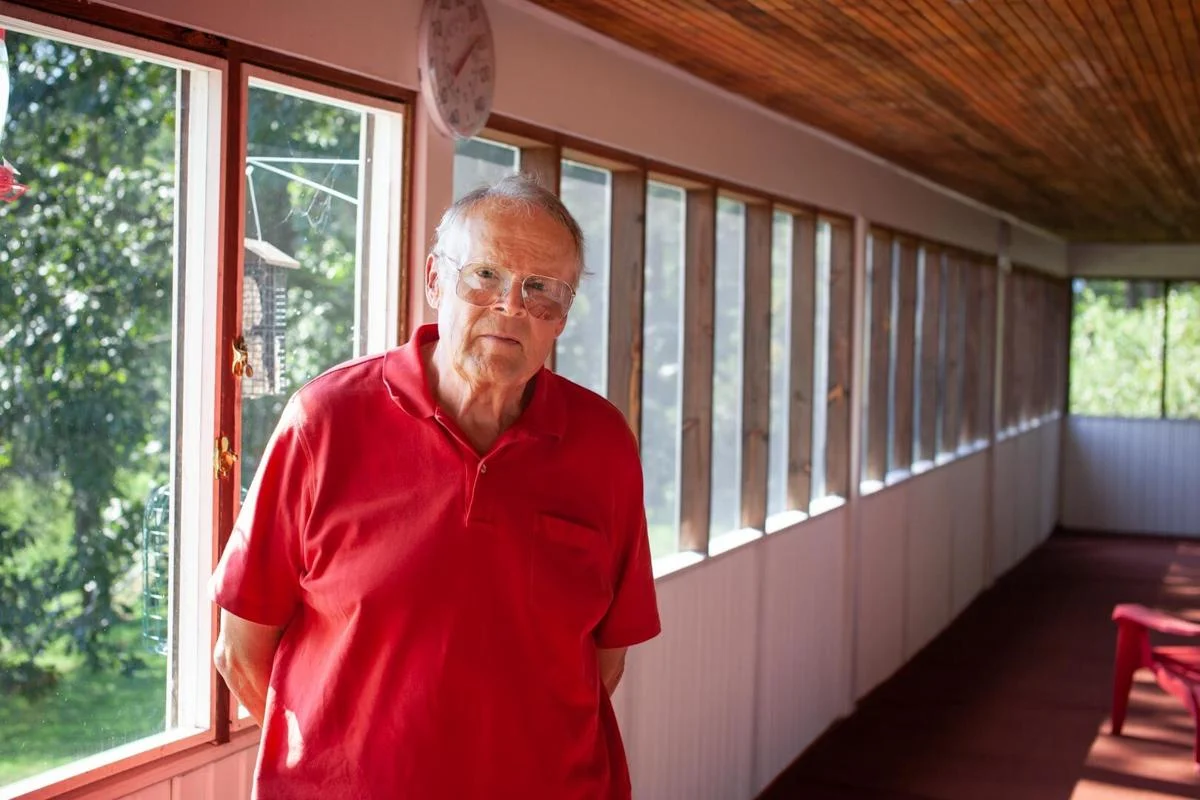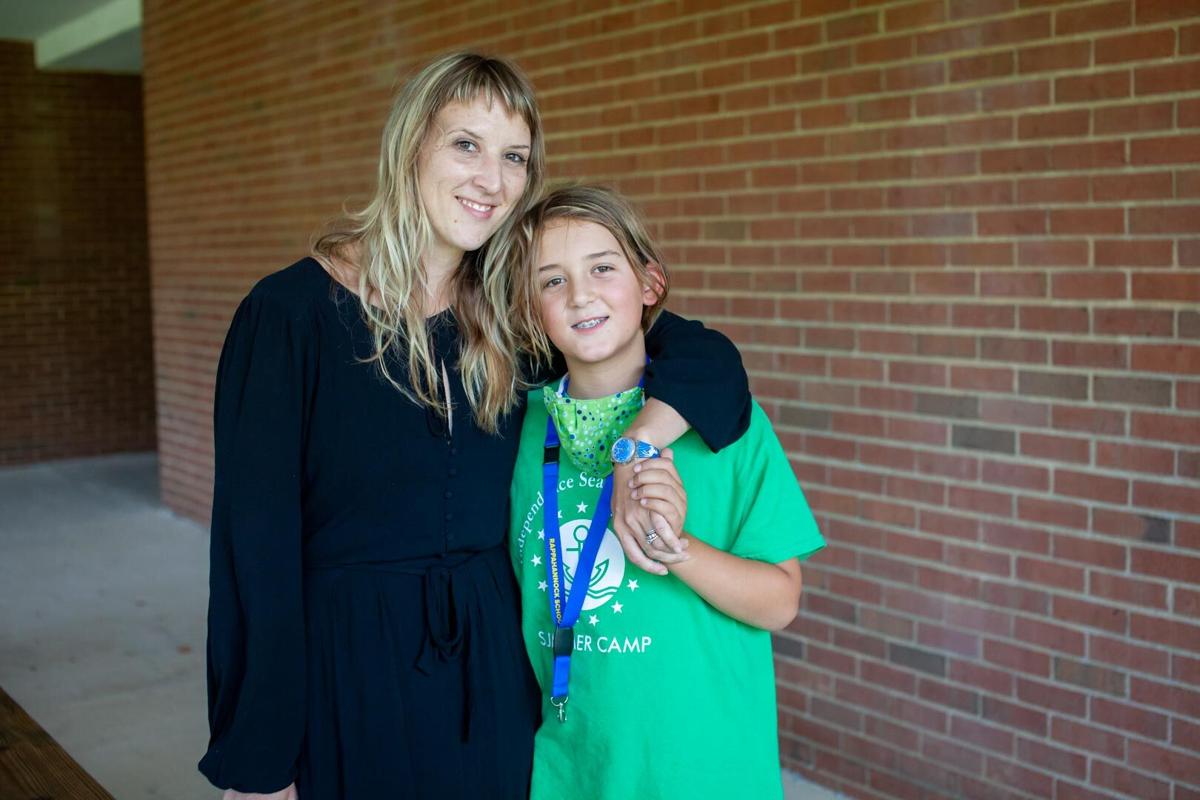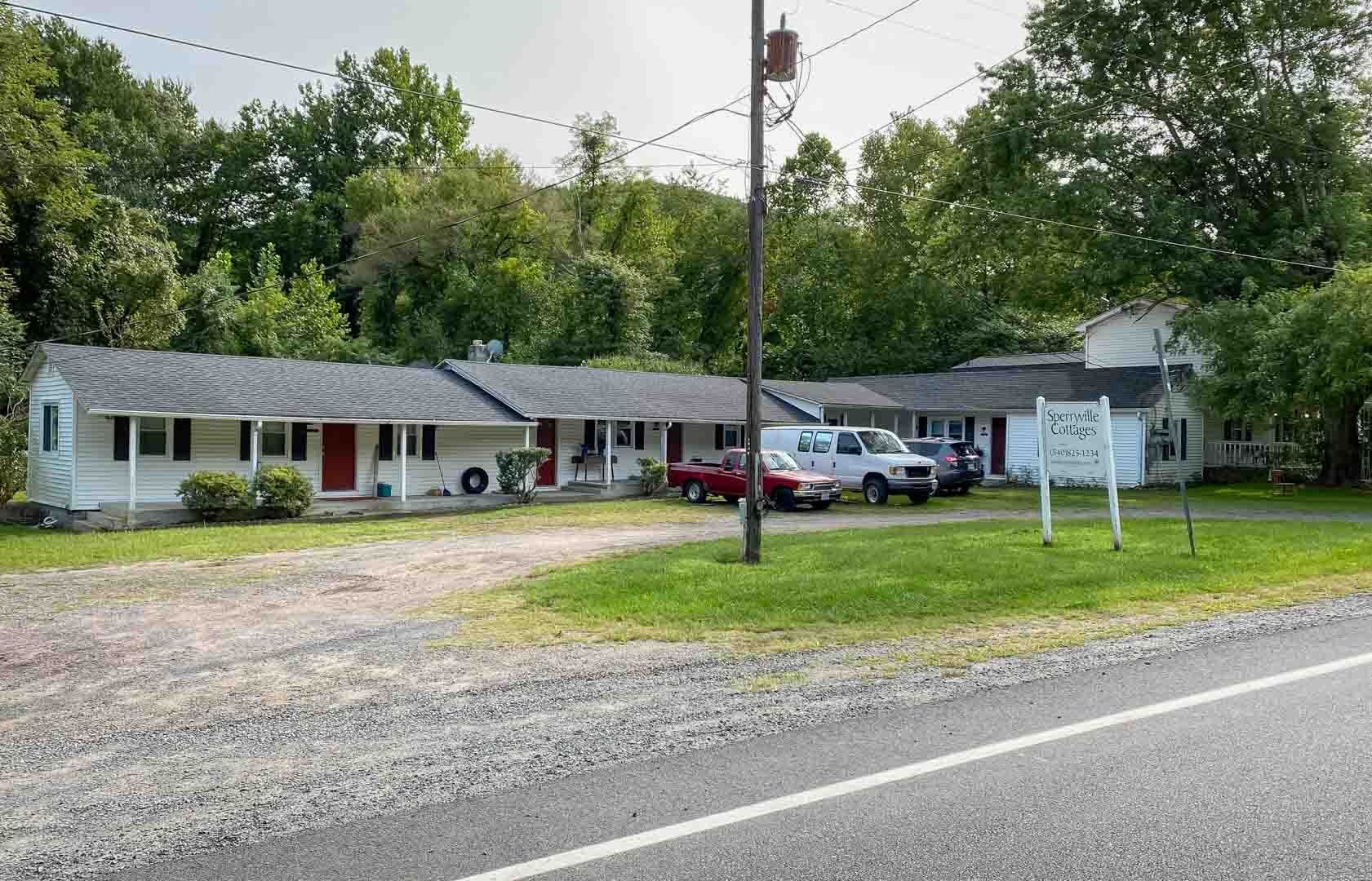Stories of the search for home in Rappahannock
Home means something different to everyone. Yet what we discovered through responses to a Community Housing Questionnaire we circulated last year is that those who choose to make Rappahannock home often make sacrifices to stay here.
“I’ve watched people come here and leave here because of housing,” said Jennings “Jenks” Hobson, the former pastor of Trinity Episcopal Church in Washington and a Foothills Forum board member. He’d listened to parishioners share their housing challenges, and faced them himself after retiring in 2015.

‘Jenks” Hobson (Photo/Luke Christopher)
“In order to have a healthy dynamic community, we need to explore having a better variety of housing possibilities, both for younger folks and for older folks and for those who aren’t so wealthy,” Hobson said.
“I deeply believe that we are not a healthy community because we are out of balance.”
Here are the stories of three residents – two current and one former – that sketch a picture of life in Rappahannock and what it means to find a home here.
Hope Dunn
43 | Working professional, reared in Rappahannock

(Photo/Luke Christopher)
For Hope Dunn, having a home in Rappahannock is about staying close to her roots. She and her sisters grew up in the town of Washington and went through the public school system. Her mother and grandmother, both of whom she was close to, are buried here.
Hope also wanted to raise her daughter, 11-year-old Marley, in a place where she could play outdoors and enjoy a childhood much like her own.
But finding a rental home for $1,200 a month was tough. It was even harder to find one at that price that was livable.
To stay in the county she needed a house with an internet connection allowing her to work remotely one day a week as a graphic designer and desktop publisher for a health-care company in Reston. She preferred something small with good access to main roads.
She also didn’t want a monthly payment that would eat up all of her paycheck, which is above the county’s median household income. Hope set her budget after calculating costs for everything from groceries to commuting to movie nights out to a college fund and retirement savings.
“I had to sit down and be like, ‘Can I really afford $1,600?’” she said, referencing the going price for rentals with everything she needed. When she’d factored in all the other costs of living, the answer was no.
“It wasn’t something that I didn’t think about,” Hope said.
It wasn’t just a lack of options. The homes that were available often seemed overpriced, in need of work, or both.
On one hand, Hope wasn’t in a rush to move so she had the luxury of time to search. On the other, she had a network she could tap into that eventually paid dividends. Her quaint two-bedroom house in Amissville came to her through a friend wanting to upgrade.
She recently extended her lease for another year, but buying a home still feels out of reach.
Hope also has concerns about Rappahannock’s future – something that gives her pause about staying and investing in a home long-term.
She worries that public safety is being hampered by a lack of cell phone service, that K-12 education is suffering due to inadequate internet, and she frets about declining school enrollment.
“I like the aspect of the rural living and my child being able to be outside and I don’t have to worry about her,” Hope said. “But at the same time, I think growth is important…And a lot of people don’t want growth here, so that’s probably one of the hardest things.”
As a Black mother, she also worries about a deficit of open-mindedness characteristic of many more diverse communities.
“Diversity is important, important to know that there’s people you communicate with or you socialize with or you are sitting in class with that look like you,” she said. “I think that’s one of the problems, too, with housing and having a diverse people come and be able to live here.”

Hope Dunn’s two-bedroom home is small, but Hope says it’s just as much space as she and Marley need. (Photo/Luke Christopher)
Hope considered moving outside the county, but didn’t want to uproot Marley. She knows people in similar positions who take on multiple jobs or freelance projects to make ends meet. Friends from high school who moved away for work would love to come back, she added, but either they can’t afford to, or they need reliable internet and cell service.
And for the county to be able to provide all those things is a matter that involves more than just housing.
“A lot would have to change,” she said. “It’s not just one thing, it’s many things.”
Cecilia Lopiano
36 | Second-grade teacher, returner

Cecilia Lopiano with her son, Eugene. (Photo/Luke Christopher)
Cecilia Lopiano’s return to Rappahannock came about quickly and somewhat unexpectedly. It also came at a particularly bad time to be searching for a home: In the midst of a pandemic when competition for rural and suburban properties has been cutthroat.
Even before COVID-19 hit, she decided to return to Rappahannock with her husband and two children after years of city living. Despite money in the bank to purchase a home and a history of home ownership, they encountered an unexpected obstacle: Sticker shock.
When Cecilia left Rappahannock in 2001 to go to school at the Art Institute of Philadelphia, she took with her a love of the countryside, fond memories of the old, rented farmhouse she grew up in and enduring friendships.
She wasn’t sure she’d return to Rappahannock, but the more she traveled she realized no place could quite capture its uniqueness.
Then her husband Vinny sold his motorcycle repair and fabrication shop, giving them an opening. Cecilia, who taught at a nonprofit charter school, emailed Rappahannock school administrators in early June to see about potential opportunities. She was not expecting a job offer. Within a matter of days she had been hired.
So she took to the internet, spending hours scouring real estate listings on Zillow. Her mother, who now lives in Nelson County, connected her to Realtor Aron Weisgerber. Cecilia and Vinny drove from Philadelphia on weekends for home tours.
To keep within their budget they considered homes in neighboring counties, even though Cecilia wanted her children to attend the school where she would be teaching and was eager to return to the place where she’d grown up.
They thought they were coming in with some leverage, but the couple quickly realized that even after pushing their price limit to a maximum of $400,000, most of what was available was a mixed bag.
“I didn’t realize it would be so different, so much higher than other markets. And being a homeowner I felt like that gave me an advantage to be a little savvy and to know what the markets are,” Cecilia said.
It made her re-evaluate where she and Vinny were financially.
“We felt like we were coming to the table with a lot to put down,” she said. In reality, they realized they would need to put down everything they had. “And I wasn’t really anticipating that.”
Unlike some other buyers, waiting for the right home to come along wasn’t an option for Cecilia since she needed to be here when classes began. So she and Vinny scaled back their checklist to its most basic: a place that was livable and within their budget.
The home the Lopianos wound up buying – a three-bedroom on eight acres outside Sperryville – had gone off the market, as many did during the pandemic. But Weisgerber found the owners were still interested in selling.
It’s small compared to their home in Philadelphia and came in at the top of their price range. But, with its wooded acreage that abuts the mountains, they decided to go all in.
“You think about city prices but then there are city wages that go along with it,” said Cecilia, whose experience as a returnee helped her realize that more could be done to provide homes for other families seeking to return and reinvest in Rappahannock.
“I think that’s really important as we look at when kids leave when they’re 17 like I did and my brother and all of my friends,” she said. “Who’s the new life of the community? It’s those who’ve stayed or those who want to come back and really foster that environment that they had.”
Jenny Schreiner
75 | Retired, now living in Culpeper

Jenny Scheiner (Photo/Luke Christopher)
Finding a place to live comes with a distinct set of difficulties for aging county residents.
Jenny Schreiner lived in Rappahannock for nearly half a century until March 2019.
Then she needed to leave the rental she’d been in for the past 14 years and wasn’t able to find another place she could afford with limited time to do so. Not only was she forced to leave her affordable rental, she had to leave the county altogether. Jenny loves Rappahannock, but she discovered that when you’re out, you’re truly out.
Jenny moved to Rappahannock from Washington, D.C. in the early 1970s after discovering it through a friend who rented a place here on the weekends. She didn’t have much money, but it wasn’t expensive to live in Rappahannock then, and she’d fallen for it.
She picked up work “catch as catch can,” she said, painting roofs and barns, working with people who did renovations and cleaning. She also raised a son who graduated from the public high school.
“It was easy to live without doing too much because the rent and everything was so cheap,” she said.
Convenience was never an issue for Jenny, who likes her privacy and was used to it. Even after she was declared legally blind she still mowed her own yard and split wood. She valued being able to work outside and feed the birds. As a renter she also moved a lot, something other renters we spoke to experienced.
“A friend of mine once said, ‘it’s like musical houses,’” she said.
Jenny gets a housing voucher through the Virginia Housing Development Authority, which she qualified for after she became legally blind and was deemed eligible for disability.
Under the program, she pays a certain portion of her rent through her Social Security insurance and the government pays the rest. At the time of her move, the program would have allowed her to spend up to $825 on housing, she estimated.
But finding something for $800 in Rappahannock was difficult, she said. So was having to move out of the county she had lived in for decades.
“It’s the idea of having to leave your home,” said Jenny. “That’s the bottom line in all this: That human feeling of just missing where you were for so long.”
The summer after she lost her home, Jenny also lost her son, making the experience all the more traumatic.
She now lives on the ground floor of a senior apartment complex in Culpeper, which she described as nice but “not my cup of tea.” She misses the trees and feeding the birds. She misses the dark nights and the quiet.
She also misses those in her Rappahannock support group, who were there for her when she lost her son. That’s just as important now, in the seventh month of an ongoing pandemic.
Jenny is still trying to get back to Rappahannock and has people keeping an eye out for rentals. She’s been saving money to move back if the opportunity arises. Ideally, it would be a small house, not too far from the road. She’d like a clothes line and would need a mailbox so she can continue writing the birthday cards for everyone at Rapp at Home, where she’s a devoted member.
But she worries there isn’t a place for her in the county any longer.
“I don’t think anyone should ever have to leave their home. And I don’t think anyone else should make that decision for them,” she said.
“I would hope that we all could find something.”



